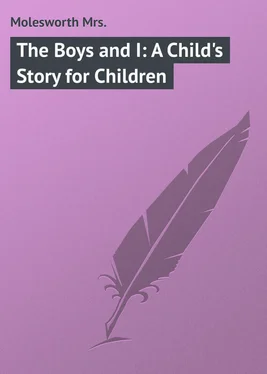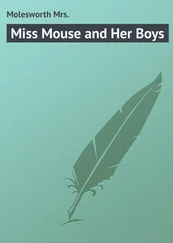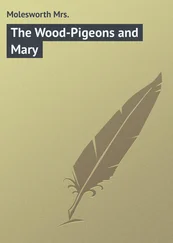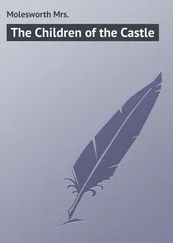Mrs. Molesworth - The Boys and I - A Child's Story for Children
Здесь есть возможность читать онлайн «Mrs. Molesworth - The Boys and I - A Child's Story for Children» — ознакомительный отрывок электронной книги совершенно бесплатно, а после прочтения отрывка купить полную версию. В некоторых случаях можно слушать аудио, скачать через торрент в формате fb2 и присутствует краткое содержание. Издательство: Иностранный паблик, Жанр: foreign_prose, foreign_children, на английском языке. Описание произведения, (предисловие) а так же отзывы посетителей доступны на портале библиотеки ЛибКат.
- Название:The Boys and I: A Child's Story for Children
- Автор:
- Издательство:Иностранный паблик
- Жанр:
- Год:неизвестен
- ISBN:нет данных
- Рейтинг книги:5 / 5. Голосов: 1
-
Избранное:Добавить в избранное
- Отзывы:
-
Ваша оценка:
- 100
- 1
- 2
- 3
- 4
- 5
The Boys and I: A Child's Story for Children: краткое содержание, описание и аннотация
Предлагаем к чтению аннотацию, описание, краткое содержание или предисловие (зависит от того, что написал сам автор книги «The Boys and I: A Child's Story for Children»). Если вы не нашли необходимую информацию о книге — напишите в комментариях, мы постараемся отыскать её.
The Boys and I: A Child's Story for Children — читать онлайн ознакомительный отрывок
Ниже представлен текст книги, разбитый по страницам. Система сохранения места последней прочитанной страницы, позволяет с удобством читать онлайн бесплатно книгу «The Boys and I: A Child's Story for Children», без необходимости каждый раз заново искать на чём Вы остановились. Поставьте закладку, и сможете в любой момент перейти на страницу, на которой закончили чтение.
Интервал:
Закладка:
We hated being called master and missy, and of all things Racey hated being called "baby." Oh how angry he would have been if he had been awake! And then I didn't like her speaking of papa and mother in that sort of way, as if she would have liked us to say they were very ill indeed – she had such a whiney way of talking. But of course we were quite civil to her; we only squeezed each other's hands, and nobody could see that.
Mrs. Partridge opened a door on the right side of the hall. It led into the dining-room. A nice fire was burning there, but still it did not look cheerful – "not a bit," I said to myself again – that thought was always coming into my head – "not a bit like our dining-room at home." But still it was nice to see a fire, and Tom and I, still holding each other's hands, went up to it and stood on the rug looking at the pleasant blaze.
"You've had a cold journey I'm afraid," said Mrs. Partridge.
"Yes, ma'am, very," said Tom, who fancied she was speaking to him. He blinked his eyes as he looked up to her, for he had been asleep in the train, and coming into the light was dazzling.
"Dear me," said Mrs. Partridge at once, "what weak eyes he has! What do you do for them, nurse? He must take them of his mamma, for our young gentlemen always had lovely eyes."
"I'm sure he doesn't get ugly eyes from mother," I said indignantly. "Mother has beautiful eyes, and Tom has nice eyes too. They're not weak."
"Deary me, deary me," exclaimed Mrs. Partridge, "what a very sharp-spoken young lady! I'm sure no offence was meant, only I was sorry to see little master's eyes so red. Don't they hurt you, my dear?"
"No thank you, ma'am," said Tom, still holding my hand very tight.
He didn't quite understand what had been said. He was a very little boy and very sleepy. I wondered what made him say "ma'am" to Mrs. Partridge, for of course he never did in speaking to ladies. I think it must have been some confused remembrance of our playing at ladies, for Mrs. Partridge had a sort of peepy way of talking, something like the way we did when we were pretending ladies.
Pierson had said nothing. I don't think she liked what the old housekeeper said about mother's eyes any better than I did, but she was vexed with me already, and more vexed still, I suppose, at my "answering back" Mrs. Partridge, and so she wouldn't speak at all.
Then Mrs. Partridge, who all the time meant to be very kind to us, you see, took us up-stairs to our rooms – they were on the second floor – above what is always the drawing-room floor in a London house, I mean, and they looked to the front. But to-night of course – I don't know if it is right for me to say "to-night," when I mean that night, but it is easier – we did not notice whether they looked to the front or not. All we did notice was that in the one which was to be the day nursery the fire was burning cheerfully, and the table was neatly spread with a white cloth for tea.
Tom, who was looking very sad, sat down on a chair by the fire and pulled me close to stand by him.
"Audrey," he whispered, "I do feel so sad, and I don't like that Mrs. Partridge. Audrey, I can't eat any tea. I didn't think it would have been nearly so bad, mother's going away and us coming to London. I don't like London. I think it would have been much better, Audrey, if we had died – you and I when we had the measles."
And stooping down to kiss my poor little tired brother, I saw that two big tears were forcing themselves out of his eyes; in spite of all his trying to be manly, and not to let Mrs. Partridge see him crying, he could not keep them in any longer. I threw my arms round him and kissed his poor red eyes. "Horrid old woman," I said to myself, "to say he had ugly eyes." And a feeling came over me that I can hardly say in words, that I would put my arms round Tom and Racey and never let them go till mother came back again, and that nobody should dare to vex them or make them cry. I felt, in that minute, as if I had grown quite big and strong to take care of them – as if I were really their mother. I kissed him and kissed him, and tried to think of something to comfort him.
"Tom, dear," I said, "do come and have your things off, and try to take some tea. There are Bath buns, Tom," I added.
But Tom still shook his head.
"No thank you, Audrey," he said. "I can't eat anything – I can't indeed. It would have been better, Audrey, it would really, if you and I had died."
"But poor Racey," I said. "He would have been all alone – just fancy that."
"Perhaps they would have taken him with them," said Tom dreamily. Then he put his arms round me and leant his little round head on my shoulder.
"I'm glad I've got you , Audrey," he whispered, and in that there was some comfort. Still, altogether, I felt what he said was true; it was very sad for us.
CHAPTER IV.
THE AIR-GARDEN
"But children, good though they may be,
Must cry sometimes when they are sad."
It was not quite so bad the next morning. That is one good thing of being a child, I suppose – at least mother says so – things never are quite so bad the next morning!
We all slept very soundly; we had three nice little beds in one rather big room, which we thought a very good plan; and the first thing that woke me was feeling something bump down on the top of me all of a sudden. It was Racey. He looked quite bright and rosy, all his tiredness gone away; and then you know he was really such a very little boy – only five – that he could not be expected to remember very long about poor mother going away and all our trouble.
"Audrey," he said, in what he meant to be a whisper, but it was a very loud one, "Audrey, I don't want to wake Tom. Poor Tom's so tired. Audrey, let me get in 'aside you."
He had clambered out of his bed and into mine somehow; and though it was against rules to get into each other's beds – mother had had to make the rule because Tom and I got in the way of waking each other so dreadfully early to tell stories – I could not this first morning refuse to let the poor little thing get in under the nice warm clothes to be cuddled.
"Oh dear, Racey, what cold little toes you've got," I said. "You haven't been running about without your slippers on, surely?"
"Just for a minute; don't tell Pierson," said Racey. "I wanted to look out of the window. Audrey, this is such a funny place – there's no trees and no garden – and lots and lots of windows. Is all the windows Uncle Geoff's?"
"Oh, no – there are lots of other people's houses here," I said. Poor little Racey had never been in a town before. "In London all the houses are put close together. You see, Racey, there are such a lot of people in London there wouldn't be room for all the houses they need if each had a garden."
"But some peoples has little gardens — air gardens," said Racey eagerly. "There's one I sawed out of the window."
" Air gardens! What do you mean, Racey?" I said.
"High up – up in the air," he explained. "Sticking up all of theirselves in the air."
"Oh, I know what you mean – you mean a little glass place for flowers," I said. "I've seen those – once I was in London before with mother, in a cab, when we were coming from Tonbridge Wells."
" Were you?" said Racey, greatly impressed. "Was Tom?"
"No, not Tom – only me. When we're dressed, Racey, I'd like to look out of the window at the air garden."
"Come now ," said Racey. But I firmly refused to get out of bed till Pierson came, as it was one of the things mother had particularly told me not to do – we had so often caught cold with running about like that. And it was a good thing we didn't, for just then Pierson came into the room looking rather cross, and if she had found us running about without our slippers on she'd have been crosser still.
Читать дальшеИнтервал:
Закладка:
Похожие книги на «The Boys and I: A Child's Story for Children»
Представляем Вашему вниманию похожие книги на «The Boys and I: A Child's Story for Children» списком для выбора. Мы отобрали схожую по названию и смыслу литературу в надежде предоставить читателям больше вариантов отыскать новые, интересные, ещё непрочитанные произведения.
Обсуждение, отзывы о книге «The Boys and I: A Child's Story for Children» и просто собственные мнения читателей. Оставьте ваши комментарии, напишите, что Вы думаете о произведении, его смысле или главных героях. Укажите что конкретно понравилось, а что нет, и почему Вы так считаете.












